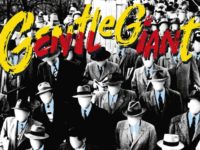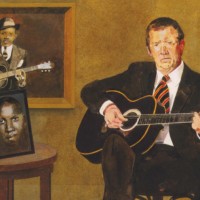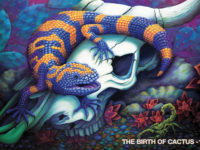The John Mayall musical saga is definitive proof that Homer’s Odysseus isn’t the only hero who has graced the Western world with an epic and quite exciting Hard Road journey.
For the novice: Let’s just say it’s been a long musical ride. John Mayall is the godfather of British blues, all the way from his native Manchester, with his intense devotion to the important American (and quite sacred) blues idiom, something we always had in our heritage, but at least in my mid-western Wisconsin state, something that never quite filled the record racks at our local department stores. (That’s where we bought our music, before the advent of “head shops” in the low-rent streets.)
I suppose the grass is always greener (or in this case, a bit more blue). The Beatles sold us Little Richard and Chuck Berry. But the Rolling Stones’ albums and the big-label American releases of British vinyl records (with really cool covers!) from bands like Ten Years After, Savoy Brown, Procol Harum, Cream, the Keef Hartley Band, the Groundhogs, Led Zeppelin and, of course, the ever-obedient to the faithful true Chicago electric bar-room vibe John Mayall were vital buys.
Together, they opened doors to Slim Harpo, John Lee Hooker, Robert Johnson, Sonny Boy Williamson, Muddy Waters, Willie Dixon and, well, countless others. (My friend Kilda Defunt insists that I mention Memphis Minnie!)
To be blunt, with an odd Anglophile American blues-loving observation: The early John Mayall albums are all classic blues-rock albums. The “Beano” album has Eric Clapton on guitar, but that was just the start. A Hard Road sings with the sublime guitar of a pre-Fleetwood Mac Peter Green. Bare Wires expands into a big progressive-jazz ensemble. It’s an amazing record.
Turning Point (a personal favorite!) is a quiet cauldron that stirs with Jon Mark’s acoustic guitar and Jonny Almond’s sax and flute work. And Blues from Laurel Canyon fires on (a pre-Rolling Stones) Mick Taylor cylinders. Then (and I am certain of this), on one of those creation days, God gave a non-reported approving nod to jazz-rock. And the brilliant Moving On and Jazz Blues Fusion, in a Biblical British blues thumbing way, came to pass.
But to this re-release of John Mayall’s 1980 album Road Show Blues, which is now available again with “revamped art work featuring vintage photos with gatefold jacket with red-marble vinyl” (and a CD digipak). With or without the red marble, Road Show Blues continued Mayall’s Crusade of hard-rocking harmonica-injected Chicago-styled dance-floor boogie that grooves in a wonderfully imbibed (if given half a chance!) cellular level inside every human soul.
The LP just huffs and puffs a deep celebrated Saturday night not-quite-remembered memory that knows redemption is only a Sunday service away. Odd, but for all the blues in Mayall’s music, he always elevates a communal vibe that’s just a hell of a lot of fun. But Road Show Blues is hot-wire stuff.
“Why Worry” jump starts a latent battery with ballroom piano, a sinuous guitar solo, and Mayall’s s preacher vocals. “Road Show,” with Maggie Parker on dual lead voice, dances in the nuances of a really nice Foghat tune. That’s a compliment. The sweaty dance continues with “Mama Talk to Your Daughter,” which has more give-and-take lead vocals and James Quill Smith’s snaky guitar that pulses in unison with harmonica revelation. Then, “A Big Man” digs into a bass guitar-driven groove (Thank you, Kevin McCormick!) while the guitar and piano dance into that lost Saturday night memory.
Now, by the early ’80s, John Mayall’s star had lost a bit of its shine, but he weathered the stormy seas as the blues commercial boom lost its interesting edge to harder-rock music and progressive bands. This album wasn’t even released in the United States. But, as Cream lyricist, Piblokto! and Battled Ornaments frontman Peter Brown once said, “Things May come and things may go, but the art school dance goes on forever.” And like any other (perhaps a bit more famous) art-school blues-loving bands, Mayall and company still kicked up a whole lot of Willie Dixon’s “wang dang doodle” and all of that other “sawdust on the floor.”
There’s more blues drama. “Lost and Gone” slows the pace and is a nice moment of slide-guitar reflection, with a deep heartbeat percussion from Soko Richardson. Then a live recording of “Mexico City” unleashes more guitar guile, with bass and drum solo. It’s a really nice open-throttled prelude to “John Lee Boogie,” a tune that (oh my!) condenses the side-long “Savoy Brown Boogie” into an intense (just over) four-minute mile.
And the ruckus continues to rock with “Reaching for a Mountain.” An organ pumps the tune, and quite frankly, there’s just more of that “sawdust” all over “the floor,” as the Mayall and company seriously get in the Band’s “Don’t Do It” territory. The final song on Road Show Blues is the live recording of “Baby What You Want me to Do,” which again features Maggie Parker on dual lead vocals as the tune simply slides into the warm and satisfactory moments of a raw Chicago (or any where!) final weekend celebration that joyously confronts the upcoming work-a-day week.
Indeed, John Mayall has travelled epic seas. He’s been there and done that in the tough melodic confessional in any version of British blues rock history, way too many times. As my (before-mentioned) friend Kilda Defnut always says, “Those Sirens sure play a lean and clean Top 20 hit song.”
And amid the countless recordings, countless superstar sidemen, heroic blues voyage, and even declining industry notoriety in the blues-rock pantheon, John Mayall – the guy who heard those Sirens’ song over way too many years – still resisted the commercial call and just played a mean, authentic and very defiant British boogie-rocking and heaven-sent harmonica-blown blues.
- Coincidence – ‘Coincidence,’ ‘Clef de Ciel’ + ‘Archives 1973-1974’ (2024) - November 17, 2024
- Mile Marker Zero – ‘Coming of Age’ (2024) - October 14, 2024
- Burton Cummings – ‘A Few Good Moments’ (2024) - October 7, 2024




